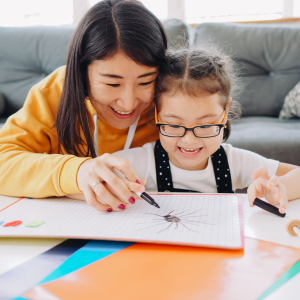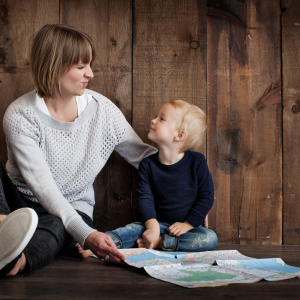Becoming a mom is one of the most rewarding yet overwhelming experiences of your life. As you hold your tiny newborn in your arms, you may feel an instant surge of love—and an equally strong flood of questions. How do I raise this little one with love, discipline, and kindness? That’s where positive parenting tips come in.
Positive parenting focuses on empathy, communication, respect, and nurturing a strong parent-child bond. It’s not about being perfect. It’s about being present, consistent, and kind. Whether you’re in the third trimester or navigating the fourth trimester, this complete guide to positive parenting tips will walk you through practical, real-life strategies to raise a secure, emotionally intelligent child.
Let’s dive in.
Table of Contents
What Is Positive Parenting?
Before we get into actionable positive parenting tips, let’s understand what it means.
Positive parenting is a parenting style based on:
- Mutual respect
- Encouragement over punishment
- Open communication
- Emotional support
- Gentle guidance
It aims to raise confident, resilient, and emotionally balanced children. Instead of harsh discipline or threats, you guide your child through teaching, modeling behavior, and connecting emotionally.

Why Positive Parenting Tips Matter
Here’s why positive parenting tips is especially crucial for newborns and toddlers:
- Builds trust and security
- Encourages better brain development
- Promotes emotional regulation in kids
- Reduces behavioral issues later on
- Strengthens the parent-child relationship
From the very first days of life, your baby is absorbing how you respond, how you speak, how you touch, and how you nurture. These cues form the foundation of their emotional and social health.
What Is the Purpose of Parenting?
The purpose of parenting goes far beyond feeding, bathing, and keeping a child safe. At its core, parenting is about guiding a child to grow into a kind, capable, emotionally healthy, and independent human being. It’s about shaping their heart, mind, and character through love, support, and structure.
The Main Purposes of Parenting:
1. To Provide Safety and Security
A parent’s first role is to create a stable, nurturing environment where a child feels physically and emotionally safe.
2. To Teach Life Skills and Values
Parents help children learn basic life skills—like communication, problem-solving, and responsibility—as well as values such as honesty, empathy, and kindness.
3. To Build Emotional Strength
Through positive parenting, children learn how to recognize, express, and manage their feelings. This emotional foundation supports healthy relationships later in life.
4. To Encourage Independence
A key purpose of parenting is preparing children to function confidently in the world without constant guidance, step by step.
5. To Support Growth and Potential
Every child has unique strengths. Parenting helps them discover who they are, develop their talents, and reach their full potential.

Importance of Positive Parenting Tips
Positive parenting lays the foundation for your child’s emotional, social, and mental development. By focusing on connection, empathy, and gentle guidance, you help your child grow up feeling secure, respected, and confident. It’s not just about avoiding harsh discipline—it’s about teaching life skills through love and patience.
Why positive parenting matters:
- Builds strong parent-child bonds through trust and emotional safety
- Encourages healthy brain development, especially in the early years
- Promotes better behavior by teaching rather than punishing
- Boosts your child’s self-esteem and emotional intelligence
- Creates a peaceful home environment where children feel heard and valued
When you practice positive parenting, you’re not just raising a well-behaved child—you’re shaping a kind, resilient human being.
Positive Parenting Tips for Healthy Child Development
Every moment you spend nurturing, guiding, and supporting your child shapes their growth in powerful ways. These positive parenting tips are not just about better behavior—they support your child’s emotional, social, and cognitive development from the very beginning.
1. Respond with Sensitivity
When your baby cries or your toddler has a meltdown, respond with calmness and compassion. Meeting their emotional needs builds security and trust.
2. Communicate Early and Often
Talk, read, and sing to your baby daily. Early communication boosts brain development and strengthens your bond.
3. Encourage Exploration Safely
Let your child crawl, touch, play, and discover their surroundings. Be close by to offer support, not control.
4. Create a Loving, Predictable Environment
A stable routine, safe space, and loving tone give children the confidence to grow and learn.
5. Praise Effort, Not Just Results
Encourage curiosity and resilience by recognizing effort: “You worked so hard on that puzzle!” instead of only praising outcomes.
6. Set Gentle but Clear Boundaries
Children thrive when they understand limits. Use kind words, consistent routines, and calm correction to guide behavior.
7. Model Positive Behavior
Children learn more from what you do than what you say. Show kindness, patience, honesty, and respect in your daily actions.
8. Support Emotional Growth
Help your child name their feelings, validate them, and learn to manage them with calm support instead of shame or punishment.
9. Be Present and Engaged
Even 10 minutes of undivided attention can mean the world to your child. Quality time fuels secure attachment and emotional well-being.
10. Foster Independence Step by Step
Let your child try new things and learn through experience. It builds confidence, problem-solving skills, and healthy self-esteem.
What Are the Five Positive Parenting Skills?
Practicing these five core skills can help new moms build a strong, loving relationship with their child while encouraging healthy emotional, social, and behavioral development.
1. Warmth and Nurturing
Show consistent love, affection, and emotional support.
From day one, your baby needs to feel safe, seen, and cared for. Cuddles, soothing tones, gentle touch, and kind words help create a nurturing environment.
Why it matters:
Warmth builds emotional security, strengthens attachment, and boosts your child’s overall well-being.
2. Positive Communication
Speak and listen with kindness and respect.
Even newborns benefit from hearing your voice. As your child grows, open, respectful conversations help them learn how to communicate effectively.
Tips:
- Use gentle words and tone
- Acknowledge your child’s feelings
- Listen actively and validate their emotions
Why it matters:
Positive communication helps your child feel heard, valued, and confident in expressing themselves.
3. Consistent Boundaries and Gentle Discipline
Set clear rules and follow through calmly.
Positive parenting avoids harsh punishment. Instead, it focuses on teaching, guiding, and setting healthy boundaries.
Tips:
- Use redirection instead of yelling
- Be firm but kind
- Keep rules simple and consistent
Why it matters:
Gentle discipline teaches self-control and respect while reducing fear and defiance.
4. Support for Independence
Let your child try, fail, and learn.
Encourage your little one to explore, make choices, and participate in age-appropriate tasks. Cheer them on as they figure things out.
Tips:
- Let toddlers dress themselves
- Offer two simple choices
- Praise effort, not just success
Why it matters:
Fostering independence builds confidence, resilience, and problem-solving skills.

5. Being a Positive Role Model
Your child learns by watching you.
The way you handle stress, speak to others, and respond to challenges sets the tone for how your child will behave.
Tips:
- Show empathy, patience, and honesty
- Practice saying “please,” “thank you,” and “I’m sorry.”
- Handle mistakes with grace
Why it matters:
Modeling positive behavior helps your child develop strong values and social skills.
What Is the Most Positive Parenting Style?
The most widely recognized parenting style is the authoritative parenting style.
This approach combines warmth, responsiveness, and nurturing with clear rules, consistent boundaries, and respectful discipline. It’s considered the healthiest and most effective parenting style across cultures and developmental stages.
Key Traits of the Authoritative Parenting Style:
- High warmth and love: Parents are emotionally supportive and deeply involved in the child’s life.
- Clear, consistent boundaries: Rules are well-defined but explained with reason, not imposed with fear.
- Respectful discipline: Mistakes are treated as learning opportunities, not punishable offenses.
- Open communication: Children are encouraged to express their thoughts and feelings freely.
- Fostering independence: Kids are given room to explore and grow within safe, guided limits.
Why Authoritative Parenting Is the Most Positive:
- Promotes secure attachment and trust
- Encourages emotional intelligence and self-regulation
- Leads to better social skills and academic success
- Reduces behavioral problems over time
- Raises confident, respectful, and resilient children
15 Essential Positive Parenting Tips for New Moms
Motherhood is magical—but also challenging, especially in the early days. These positive parenting tips will help new moms build a strong, loving bond while gently guiding their baby’s growth and behavior from the very start.
1. Start With Emotional Availability
The very first of all positive parenting tips is simple: Be emotionally present.
Your baby needs more than food and sleep—they need to feel seen, safe, and loved.
How to be emotionally available:
- Hold your baby often. Skin-to-skin contact fosters bonding.
- Make eye contact during feeding and diaper changes.
- Smile and talk to your baby in a gentle, loving voice.
- Respond quickly to cries. Newborns cry because they need help, not manipulation.
This early emotional investment builds trust, which is the basis for secure attachment.
2. Learn Your Baby’s Cues and Signals
Positive parenting starts with tuning in. Every baby is unique, and learning their cues is one of the most powerful positive parenting tips you’ll ever apply.
What to look for:
- Hunger cues: rooting, sucking on hands
- Sleepy cues: rubbing eyes, yawning, fussiness
- Overstimulation cues: turning head away, arching back
When you respond to your baby’s signals instead of using rigid schedules, they learn that their feelings and needs matter.
3. Talk, Read, and Sing from Day One
Language is a connection. Even before your baby can understand words, your voice is comforting and stimulating.
Positive parenting tips for newborn communication:
- Narrate what you’re doing: “Mommy is changing your diaper now.”
- Read simple board books every day.
- Sing lullabies and rhymes often.
- Imitate your baby’s coos and sounds—it encourages early language.
This strengthens both brain development and emotional bonding.
4. Use Gentle Touch and Soothing Techniques
Babies communicate through body language and respond best to gentle, reassuring touch.
Positive parenting tips for soothing:
- Try infant massage to calm fussiness and improve sleep.
- Rock gently or use a baby carrier to keep baby close.
- Offer comfort when your baby is upset—not just for physical needs but emotional ones too.
This tells your child, “Your emotions are valid, and I’m here for you.”
5. Practice Consistent Routines
Babies thrive on predictability. While they don’t need strict schedules, they do benefit from consistent rhythms.
Positive parenting tips for routines:
- Create a gentle bedtime routine: bath, story, lullaby, cuddle.
- Use consistent cues for naps and feeding.
- Don’t stress over timing—focus on sequence and predictability.
Consistent routines help your baby feel safe and reduce meltdowns as they grow.
6. Set Realistic Expectations
One of the most overlooked positive parenting tips is adjusting your expectations.
Your newborn isn’t manipulating you. Your toddler isn’t being “bad” on purpose. Behavior is communication, especially in the early years.
Tips for staying realistic:
- Learn about child development milestones.
- Expect crying, messes, sleep regressions—they’re normal.
- Respond with compassion, not comparison to other babies.
Positive parenting means meeting your child where they are, not where you think they should be.
7. Discipline with Connection, Not Punishment
Positive parenting does not mean permissive parenting. It’s about setting clear, age-appropriate boundaries while staying calm and connected.
Positive parenting tips for discipline:
- Use redirection instead of saying “no” constantly.
- Explain rules in simple language: “We don’t hit. Hitting hurts.”
- Avoid time-outs for young toddlers—use time-ins where you sit with them and talk it through.
- Stay consistent with your boundaries without yelling or threats.
Discipline is about teaching, not punishing. Your goal is to guide—not control—your child’s behavior.
8. Model the Behavior You Want to See
Your child learns more from what you do than what you say. Modeling is one of the most powerful positive parenting tips you can practice daily.
Model:
- Kindness and empathy—even when you’re frustrated
- Saying “please,” “thank you,” and “I’m sorry”
- Handling mistakes gracefully
- Expressing your feelings calmly
Your child watches you to learn how to behave, communicate, and process emotions.
9. Validate Your Child’s Feelings
Even infants and toddlers have big emotions. Don’t dismiss them—acknowledge and name them.
Examples of emotional validation:
- “You’re feeling sad because the toy is gone. That’s okay.”
- “I see you’re angry. It’s hard when we can’t do what we want.”
- “You’re scared. I’m right here.”
Validating emotions helps your child feel understood and teaches emotional literacy.
10. Use Positive Reinforcement
One of the simplest and most effective positive parenting tips is noticing and praising good behavior.
Instead of only reacting to misbehavior, try:
- “Thank you for waiting patiently!”
- “I love how gently you’re playing with the baby.”
- “Great job picking up your toys!”
This builds your child’s confidence and encourages cooperation.
11. Take Care of Yourself Too
You can’t pour from an empty cup. One of the most essential positive parenting tips is prioritizing your own well-being.
Self-care tips for new moms:
- Nap when the baby naps (whenever possible).
- Eat nourishing meals regularly.
- Ask for help without guilt.
- Connect with other moms for emotional support.
A regulated, rested mom is better equipped to respond calmly and positively.
12. Avoid Shaming or Labeling
Words are powerful. Negative labels like “bad boy” or “naughty” can damage your child’s self-esteem.
Instead, separate the child from the behavior:
- “I didn’t like that you threw the toy, but I still love you.”
- “Let’s try using gentle hands instead of hitting.”
Positive parenting nurtures self-worth, even during discipline.
13. Practice Mindful Parenting
Being present is a gift to both you and your baby. Mindfulness helps you respond instead of react.
How to be a mindful parent:
- Pause before reacting to tantrums.
- Notice your own emotional triggers.
- Put away distractions (like your phone) during play or feeding.
- Take deep breaths when you feel overwhelmed.
Mindful parenting keeps you calm and centered—even in chaos.
14. Encourage Independence
It might feel easier to do everything for your child, but positive parenting encourages independence from early on.
Tips to support independence:
- Let toddlers try feeding themselves.
- Give choices: “Red shirt or blue shirt?”
- Allow them to help with small tasks like putting toys away.
These moments build confidence and responsibility.
15. Be Patient and Flexible
Every day won’t be perfect. You’ll make mistakes. So will your baby. That’s okay.
Positive parenting tips remind us to:
- Offer grace to ourselves and our children.
- Apologize when we mess up.
- Stay flexible as routines and stages shift.
Parenting is a journey, not a test.
Conclusion
Positive parenting isn’t about being perfect—it’s about being present, patient, and loving as you guide your child’s early development. These 15 essential positive parenting tips offer a gentle, effective approach to building trust, teaching respect, and nurturing emotional growth from the very beginning. As a new mom, your calm voice, warm hugs, and consistent care matter more than you realize. With these tips in your parenting toolkit, you’re already creating a strong, loving foundation your child will carry for life. You’ve got this, mama—and you’re doing better than you think.








